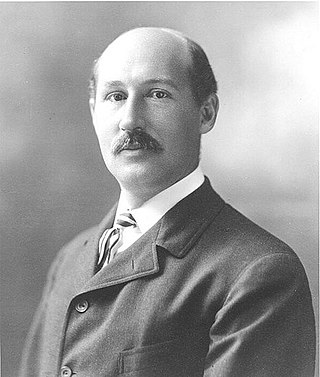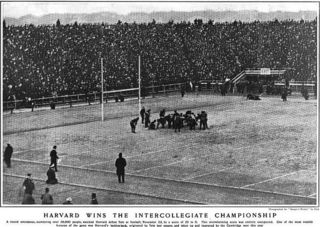Related Research Articles

A national championship in the highest level of college football in the United States, currently the NCAA Division I Football Bowl Subdivision (FBS), is a designation awarded annually by various organizations to their selection of the best college football team. Division I FBS football is the only National Collegiate Athletic Association (NCAA) sport for which the NCAA does not host a yearly championship event. As such, it is sometimes referred to as a "mythical national championship".

The 1901 College Football All-America team is composed of college football players who were selected as All-Americans by various individuals who chose College Football All-America Teams for the 1901 college football season. The only two individuals who have been recognized as "official" selectors by the National Collegiate Athletic Association (NCAA) for the 1901 season are Walter Camp and Caspar Whitney, who had originated the College Football All-America Team 13 years earlier in 1889. Camp's 1901 All-America Team was published in Collier's Weekly, and Whitney's selections were published in Outing magazine.

The 1902 College Football All-America team is composed of college football players who were selected as All-Americans by various individuals who chose College Football All-America Teams for the 1902 college football season. The only two individuals who have been recognized as "official" selectors by the National Collegiate Athletic Association (NCAA) for the 1902 season are Walter Camp and Caspar Whitney, who had originated the College Football All-America Team 14 years earlier in 1889. Camp's 1902 All-America Team was published in Collier's Weekly, and Whitney's selections were published in Outing magazine.

The 1894 college football season was the season of American football played among colleges and universities in the United States during the 1894–95 academic year.

The 1889 college football season was the season of American football played among colleges and universities in the United States during the 1889–90 academic year.

The 1892 college football season was the season of American football played among colleges and universities in the United States during the 1892–93 academic year.

The 1891 college football season was the season of American football played among colleges and universities in the United States during the 1891–92 academic year.

The 1890 college football season was the season of American football played among colleges and universities in the United States during the 1890–91 academic year.

The 1901 Harvard Crimson football team was an American football team that represented Harvard University as an independent during the 1901 college football season. In its first season under head coach Bill Reid, the team compiled a 12–0 record, shut out nine of 12 opponents, and outscored all opponents by a total of 254 to 24.

The 1906 Yale Bulldogs football team was an American football team that represented Yale University as an independent during the 1906 college football season. The team compiled a 9–0–1 record, shut out nine of ten opponents, and outscored all opponents by a total of 144 to 7. Four Yale players were selected as consensus All-Americans, and the team was selected by multiple selectors as the national champion for 1906.
The 1907 Yale Bulldogs football team was an American football team that represented Yale University as an independent during the 1907 college football season. The team finished with a 9–0–1 record, shut out nine of ten opponents, and outscored all opponents by a total of 208 to 10. William F. Knox was the head coach, and Lucius Horatio Bigelow was the team captain.

The 1900 Army Cadets football team represented the United States Military Academy in the 1900 college football season. In their fourth and final season under head coach Herman Koehler, the Cadets compiled a 7–3–1 record, shut out seven opponents, and outscored all opponents by a combined total of 109 to 68. The team's three losses came in games against Harvard (29–0), national champion Yale (18–0), and Navy (11–7).
The 1901 Army Cadets football team represented the United States Military Academy in the 1901 college football season. In their first and only season under head coach Leon Kromer, the Cadets compiled a 5–1–2 record, shut out four opponents, and outscored all opponents by a combined total of 98 to 22. The team's only loss was by a 6 to 0 score against an undefeated Harvard team that has been recognized as a co-national champion for the 1901 season. The Cadets also tied with Yale (5–5) and Princeton (6–6). In the annual Army–Navy Game, the Cadets defeated the Midshipmen by an 11 to 5 score.
The 1905 Western Conference football season was the tenth season of college football played by the member schools of the Western Conference and was a part of the 1905 college football season.
The 1906 college football season rankings included a ranking by Caspar Whitney for The Outing Magazine.
The 1907 college football season rankings included a ranking by Caspar Whitney for The Outing Magazine.
The 1905 college football season rankings included a ranking by Caspar Whitney for The Outing Magazine.
The 1904 college football season rankings included a ranking by Caspar Whitney for Outing.
The 1903 college football season rankings included a ranking by Caspar Whitney for Outing.
The 1902 college football season rankings included a ranking by Caspar Whitney for Outing and a top-sixteen rating in The Sun.
References
- 1 2 Whitney, Caspar (January 1902). Whitney, Caspar (ed.). "The Sportsman's View-Point: Ranking of Teams [1901]". Outing . Vol. XXXIX, no. 4. Outing Publishing Company. pp. 477–487. Retrieved January 26, 2024.
- ↑ Jenkins, Dan (September 11, 1967). Laguerre, André (ed.). "This Year The Fight Will Be In The Open". Sports Illustrated . Vol. 27, no. 11. Chicago. pp. 28–34. Retrieved February 8, 2016.
Polls and systems to determine the No. 1 team are not nearly so ancient as the mere naming of the "intercollegiate champion" by a Casper Whitney or a J. Parmly Paret.
- ↑ "National Champion Major Selections (1896 to Present)". 2022 NCAA Football Bowl Subdivision Records (PDF). Indianapolis: The National Collegiate Athletic Association. July 2022. p. 114. Retrieved January 4, 2023.
Caspar Whitney (1901-07), one of the founders of the first All-American Football Team. Also selected national polls for Outing magazine.